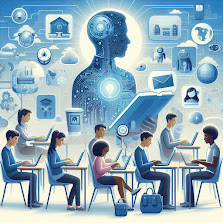exception. As AI technology advances, it is increasingly being integrated into educational systems worldwide, offering innovative solutions to age-old challenges and transforming learning experiences for the youth of tomorrow. This blog explores how AI is reshaping education and the potential benefits and challenges it brings.
Personalized Learning
One of the most significant impacts of AI in education is the ability to provide personalized learning experiences. Traditional classrooms often follow a one-size-fits-all approach, which can leave some students behind while others are not sufficiently challenged. AI can analyze individual student data to tailor educational content and pace according to each learner's needs. Adaptive learning platforms, powered by AI, can identify a student's strengths and weaknesses, offering customized exercises and resources to enhance their learning experience.
Intelligent Tutoring Systems
AI-powered intelligent tutoring systems (ITS) are transforming how students receive additional help outside the classroom. These systems provide one-on-one tutoring, offering explanations, answering questions, and providing feedback in real-time. Unlike human tutors, ITS can be available 24/7, ensuring that students have access to support whenever they need it. This can be particularly beneficial for students who may not have access to traditional tutoring services due to financial or geographical constraints.
Enhanced Teacher Support
AI is not only beneficial for students but also supports teachers in various ways. By automating administrative tasks such as grading and attendance tracking, AI allows teachers to focus more on instruction and student engagement. AI can also provide teachers with insights into student performance, helping them to identify areas where students may be struggling and adjust their teaching strategies accordingly. This data-driven approach can lead to more effective and efficient teaching practices.
Expanding Access to Education
AI has the potential to expand access to education for students in remote or underserved areas. Through online learning platforms and virtual classrooms, students can access high-quality educational resources regardless of their location. AI can also facilitate language translation and adaptive learning for students with disabilities, ensuring that education is inclusive and accessible to all.
Preparing Students for the Future
As AI becomes more integrated into various industries, it is essential for students to develop skills that will prepare them for the future workforce. AI in education can help students learn about AI technology and its applications, fostering critical thinking, problem-solving, and creativity. By incorporating AI into the curriculum, educators can prepare students for a world where AI will play a significant role in their professional and personal lives.
Challenges and Considerations
While the potential benefits of AI in education are immense, there are also challenges and considerations to address. One of the primary concerns is data privacy and security. The use of AI in education involves collecting and analyzing large amounts of student data, raising concerns about how this data is stored, used, and protected. Ensuring that AI systems are transparent and that data is handled ethically is crucial.
Additionally, there is the challenge of ensuring equitable
access to AI technology. Not all schools and students have the resources to
implement and benefit from AI-powered educational tools. Bridging this digital
divide is essential to ensure that AI in education does not exacerbate existing
inequalities.
AI is transforming education in ways that were once unimaginable. From personalized learning and intelligent tutoring to expanding access and preparing students for the future, AI has the potential to revolutionize how we educate the youth of tomorrow. As we embrace these technological advancements, it is essential to address the challenges and ensure that AI in education is implemented ethically and equitably. By doing so, we can create a future where all students have the opportunity to thrive and succeed.
